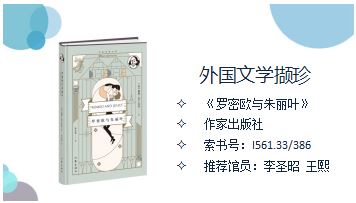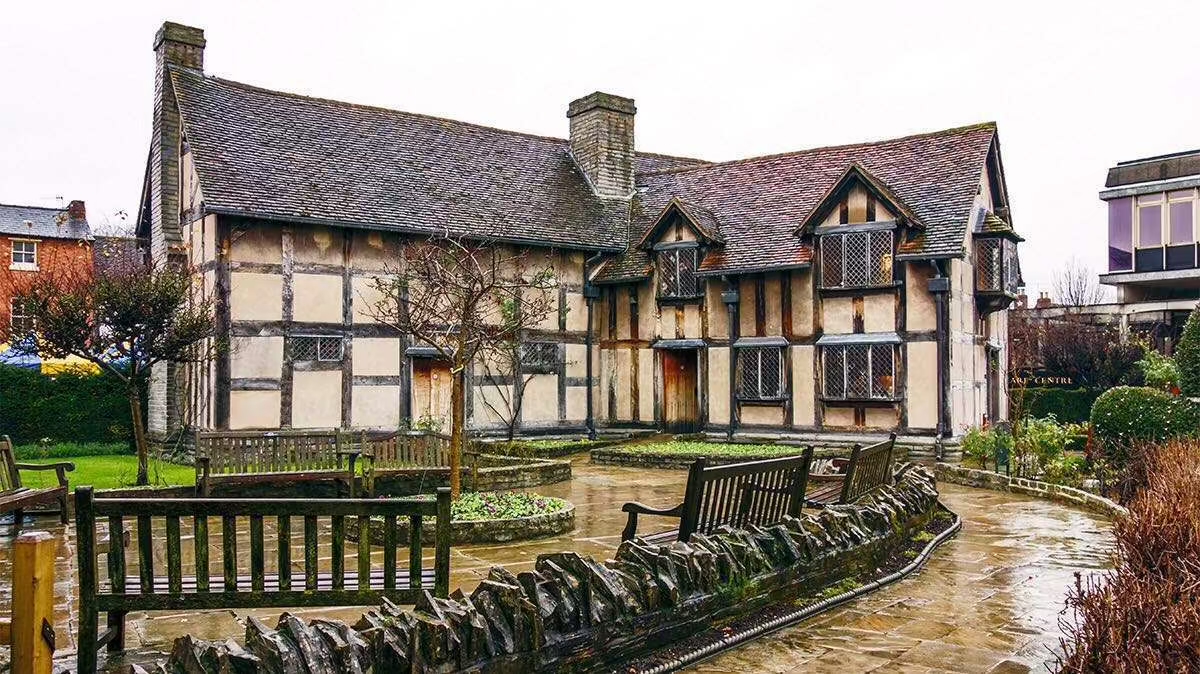您当前所在的位置是:首页>>新闻资讯>>天图简讯
天津图书馆外国文学撷珍(Classics Reading)第46期:《罗密欧与朱丽叶》(一)
发布时间:2024-04-02
烟红露绿晓风香,燕舞莺啼春日长。徜徉于明媚的春光里,伴着鸟语花香,我们即将迎来一年一度的世界读书日。本月的两期推送我们选取英国作家威廉·莎士比亚的作品《罗密欧与朱丽叶》。让我们一起捧起心爱的图书,循着莎翁的足迹,重温这段凄美的旷世绝恋。
作品简介
《罗密欧与朱丽叶》是英国剧作家威廉·莎士比亚创作的戏剧。该剧讲述了意大利贵族凯普莱特的女儿朱丽叶与蒙太古的儿子罗密欧诚挚相爱,誓言相依,但因两家世代为仇而受到阻挠的故事。
作者简介
威廉·莎士比亚(William Shakespeare,1564-1616),英国文艺复兴时期剧作家、诗人,被誉为“人类文学奥林匹斯山上的宙斯”。1564年4月23日出生于英国沃里克郡斯特拉福镇,1571年至1579年在斯特拉福文法学校读书,1587年开始演员生涯,并开始尝试写剧本。1601年创作戏剧《哈姆雷特》首演,引起文坛关注。莎士比亚的早期作品以历史剧和喜剧为主,表现出明朗、乐观的风格,中期开始转变为阴郁悲愤,以揭露批判社会黑暗为主,晚期则表现为浪漫空幻。代表作有四大悲剧《哈姆雷特》《奥赛罗》《李尔王》《麦克白》,和四大喜剧《第十二夜》《仲夏夜之梦》《威尼斯商人》《皆大欢喜》。
莎士比亚故居(图片源自百度百科,如有侵权,请联系删除)
精彩片段
| 《罗密欧与朱丽叶》(节选一)中文版 |
|
加载视频...
|
| 《罗密欧与朱丽叶》(节选一)英文版 |
|
加载视频...
|
朱丽叶 你现在就要走了吗?天亮还有一会儿呢。那刺进你惊恐的耳膜中的,不是云雀,是夜莺的声音,它每天晚上在那边石榴树上歌唱。相信我,爱人,那是夜莺的歌声。
罗密欧 那是报晓的云雀,不是夜莺。瞧,爱人,不作美的晨曦已经在东天的云朵上镶起了金线,夜晚的星光已经烧尽,愉快的白昼蹑足踏上了迷雾的山巅。我必须到别处去找寻生路,或者留在这儿束手等死。
朱丽叶 那光明不是晨曦,我知道。那是从太阳中吐射出来的流星,要在今夜替你拿着火炬,照亮你去曼多亚的路。所以你不必急着要去,再耽搁一会儿吧。
罗密欧 让我被他们捉住,让我被他们处死,只要是你的意思,我就毫无怨恨。我愿意说那边灰白色的云彩不是黎明睁开它的睡眼,那不过是从月亮的眉宇间反映出来的微光;那响彻云霄的歌声,也不是出于云雀的喉中。我巴不得留在这里,永远不要离开。来吧,死,我欢迎你!因为这是朱丽叶的意思。怎么,我的灵魂?让我们谈谈,天还没有亮哩。
朱丽叶 天已经亮了,天已经亮了!快走吧,快走吧!那唱得这样刺耳、嘶着粗涩的噪声和讨厌的锐音的,正是天际的云雀。有人说云雀会发出千变万化的甜蜜的歌声,这句话一点不对,因为它只使我们彼此分离。有人说云雀曾经和丑恶的蟾蜍交换眼睛,啊!我但愿它们也交换了声音,因为那声音使你离开了我的怀抱,用催醒的晨歌催促你登程。啊!现在你快走吧,天越来越亮了。
罗密欧 天越来越亮,我们悲哀的心却越来越黑暗。
JULIET: Wilt thou be gone? It is not yet near day:
It was the nightingale, and not the lark,
That pierc’d the fearful hollow of thine ear,
Nightly she sings on yond pomegranate tree,
Believe me love, it was the nightingale.
ROMEO: It was the lark, the herald of the morn:
No nightingale: look love what envious streaks
Do lace the severing clouds in yonder East:
Night’s candles are burnt out, and jocund day
Stands tiptoe on the misty mountain tops,
I must be gone and live, or stay and die.
JULIET: Yond light is not daylight, I know it I:
It is some meteor that the Sun exhales,
To be to thee this night a torch-bearer,
And light thee on thy way to Mantua.
Therefore stay yet, thou needs not to be gone.
ROMEO: Let me be ta’en, let me be put to death,
I am content, so thou wilt have it so.
I’ll say yon grey is not the morning’s eye,
‘Tis but the pale reflex of Cynthis’s brow.
Nor that is not the lark whose notes do beat
The vaulty heaven so high above our heads,
I have more care to stay, than will to go:
Come death and welcome, Juliet wills it so.
How is’t my soul? Let’s talk, it is not day.
JULIET: It is, it is, hie hence be gone away:
It is the lark that sings so out of tune,
Straining harsh discords, and unpleasing sharps.
Some say, the lark makes sweet division:
This doth not so: for she divideth us.
Some say the lark and loathed toad change eyes,
Oh now I would they had chang’d voices too:
Since arm from arm that voice doth us affray,
Hunting thee hence, with hunts-up to the day.
So now be gone, more light and light it grows.
ROMEO: More light and light, more dark and dark our woes.
——英文原文节选自Romeo and Juliet(London : Penguin Books, 1994.),索书号:I561.33/S527r/1994 ed
☆词汇
nightingale n. 夜莺
lark n. 云雀;百灵鸟
herald n. 预告,先兆;传令官
vt. 预示……的来临
envious adj. 羡慕的,忌妒的
harsh adj. 严厉的,刻薄的;粗糙的,毛糙的;严酷的,恶劣的;刺耳的;刺目的
woe n. 痛苦,悲伤;麻烦,问题
(单词注释来自有道词典)
文案策划:图书借阅部 李圣昭 王熙
中文音频:图书借阅部 王熙
英文音频:图书借阅部 李圣昭
编辑:宣传小组 张鑫







